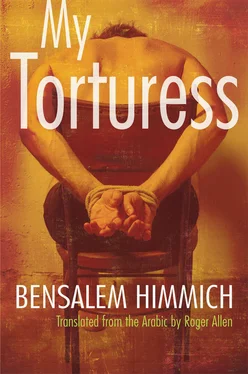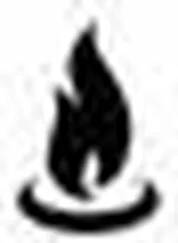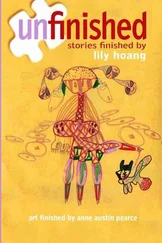“That stubborn prisoner,” he said, gritting his teeth, “is a warrior living in the past, an era long over, the kind of bully who relishes pain and desires nothing more than death and martyrdom. But our very own torturess, our female ghoul, will get to work on him and chop off his illusory sense of victory limb by limb. .”
He stared in my direction, a scary smile on his face. “Hamuda,” he asked me, “don’t you agree with me that this brilliant expression, ‘relishing pain,’ with all its semantic and morphological contradictions, is absolutely marvelous?”
I frowned, not wishing to respond to something that in view of the circumstances seemed utterly inappropriate.
“Never mind!” he went on, clearing his throat. “Forget the question, and let’s go back to you. From your file, Hamuda from Oujda, I deduce that you’re a compliant kind of person, someone who likes company. There are a few small details, some obscure matters, that I’m sure we can clear up with God’s help, relying of course on your total cooperation and a much needed veracity that you’ll freely offer us. As we all know, lies and deceit are anathema; double-crossing and obfuscation are abominations. Confusing reality and fancy simply creates discord. By my very life, foul deeds such as these are the kinds of things that groups of vagrant poets and their camp-followers — fornicators, layabouts, and debauchees all — commit all the time. May God Almighty protect us against them, keep us far removed from their circles and squabbles, and guide us by His light to the clear, unvarnished truth!”
The only thing that brought this outpouring of rhymed discourse and dissimulation to an end was a light tap on the door. The young woman offered her bashful apologies, and he told her to come in.
“What do you want, young lady?” he asked gently, clearing his throat as he did so.
“I’ve looked for her, Sir,” she replied, but I can’t find her anywhere.”
“Who?”
“Umm Qash‘am, Sir.”
“That’s very disturbing,” he replied without changing his tone. “Take a look in the biographical dictionaries and in Ibn Manzur’s dictionary as well.* If you don’t bring her to me, I’m going to deduct a third of your salary.”
At this point I asked permission to speak.
“In Arabic, Judge,” I told him, “Umm Qash‘am is a phrase that was used by people in pre-Islamic times as a synonym for Hell. God alone knows best.”
“Good for you, Hamuda” he replied, “and may God preserve you! As for you, young woman, kiss the head of this man who’s provided you with a little light and taught you something you didn’t know. Just one kiss will do.”
Without moving from my seat I was given a warm kiss on the head by this unfortunate young woman. She asked permission to leave and stumbled her way red-faced toward the door.
The judge stared at me in amazement. “I notice that, when the secretary is here, you keep your eyes lowered and don’t look straight at her!”
“I behave that way,” I replied, “in obedience to the injunctions of our Prophet: ‘He who looks at the beauty of a woman and turns away the first time, God will create a devotion for him, the sweetness of which he will find in his own heart.’”
“Good heavens, Hamuda!” the judge yelled in delight, “you’re genuinely learned and your memory is a priceless gift!”
“Forgive me, Sir,” I replied, “but my attainments are only modest.”
“True enough, modesty is a known trait of the genuinely learned. Come over here, Nahid, and stand in front of me. Take off your headdress and shake your hair to left and right. Isn’t that beautiful?! One female delight on top of another. Look at me, Hamuda. Am I supposed to be able to look away from this woman? I try; oh yes, I keep trying. I cover my eyes with my hands, but I keep seeing her as naked as Eve, and I want to have her even more. By the truth of God who created her and made her so lovely, it’s all over. It reminds me of the chap who once said: ‘Look away, even from female sheep.’ That’s what it reminds me of. .”
“I think it was Abu Yazid al-Bistami* who said that.”
“He must have been really frustrated! Looking away from female animals is one thing, but human females? No way, a thousand times no! What Ibn Sa‘d* has to say in his Tabaqat , based on the Prophet’s own dicta, makes more sense: ‘In your lower world, he has led me to like perfume and women. . ’ Nahid, put your headdress back on and get out of my sight. Leave now!”
“Now, Hamuda,” the judge went on, nervously wiping his face and bald pate with a handkerchief, “let’s go back to what we were talking about. .”
He started ranting and raving, as though talking to himself. “So that son of a bitch has insulted every single member of our august center here, even me! His file is already thick enough, but now he’s gone too far. Mama Ghula will know how to make him suffer. Then the nasty heretic will soon realize what the endgame really is and who it is that deserves to feel the flames of hell licking around them in this world rather than the next, to be flayed by her whips and tied up in chains. You heard for yourself, Hamuda, the way he talked about Umm Qash‘am in referring to all kinds of perfectly decent and upright people. When he’s brought to trial and a verdict is required, you’ll certainly be able to provide your own testimony, once I’ve given you, of course, all the necessary details about the heretic’s case from its very beginnings and the way things have proceeded to their current state.”
It occurred to me at this point that I should decline to testify in any case where the truth could never be known for sure, but I decided not to do so. It also occurred to me that I should congratulate him on the eloquence and clarity of his discourse, making sure that I made no mention of the occasional pedantry and affectation, but there again I decided against it.
The judge took off his spectacles slowly and gestured to me to come closer.
“Hamuda,” he confided to me with his nasal twang to which he added a patina of affection, “the thing that’s made me sympathize with you and not forward your file to a really nasty interviewer is that we share one particular trait in common. Do you know what it is?”
I replied that I did not.
“Both of us, Hamuda,” he went on, “are graduates of colleges from other Arab countries. You have a degree is Islamic law, and so do I; you also have one in literature, as do I. But then the fates have sent us down separate paths, so let’s thank God for giving us this opportunity to cooperate in disclosing the truth and dispelling all falsehood and deceit. All I need to do is to use my eyes to look at people’s faces; I can tell what is in their hearts and the messages conveyed by their eyes. It’s a gift I’ve had ever since my childhood. With the passage of time it has only grown and developed. God has used it to bestow on me examples to be gleaned from life’s hard experiences and the tough, yet revelatory lessons that they can offer. Even so I’ve never believed that this perspicacity of mine is a match for Zarqa’ al-Yamama*—all thanks to God for what he has bestowed on me.”
He stopped suddenly and gave me a quizzical look, but I did not show any sign of wanting to respond or agree with him.
“At my circumcision ceremony,” he went on, “my late father sacrificed a sheep and named me Hassan. He was inspired to do so by Hassan ibn Thabit, who, as you know, was the Prophet Muhammad’s own poet (Peace be upon him!), someone who accepted the Prophet’s eternal message and became a Muslim, thus saving himself from the proverbial valleys in which poets would lose themselves.* That is why, from my childhood days up till now, you’ll find me every morning reciting as many of the beautiful names of God as I can remember. My entire aspirations are focused exclusively on what is good. I married a woman who had the feminine form of my own name, Hasna’. I always treated her kindly. When we did not have any children, she wanted to get divorced, and I let her go with all due charity. I still adhere to the same principles and beliefs. I particularly abhor all thought of the use of violence; in my attitude toward everything, I always make judgment calls and advocate what is the most acceptable. My constantly repeated slogan is: yes to the good and beautiful; no, and no again, to violence. If you believe someone, you’ll get the truth. I have never beaten a prisoner, even though he may be a hardened reprobate. I’ve never tortured anyone, or even spat in anyone’s face, be they male or female. That’s the way I was born and brought up. Never in my life have I sacrificed an animal, even a lowly chicken, so how on earth could I do it to a human being? When it comes to things like hangings and executions, whether in Islamic domains or in the history of every kind of political and religious system, my entire body recoils and my soul shudders in horror. I’ll admit that, once in a while, my imagination — but it is only that — leads me to feel like flaying the hides of certain nasty individuals, too big for their own boots; I have the urge to tear them limb from limb and throw them to the famished hyenas and lions. But now, tell me about your own violence.”
Читать дальше












